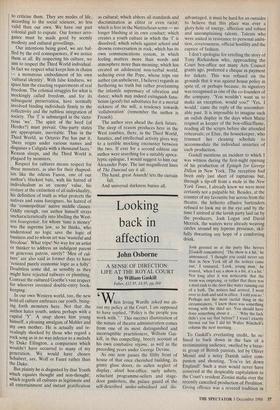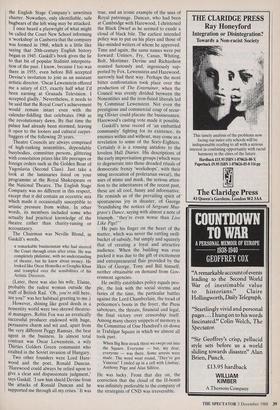Looking back in affection
John Osborne
A SENSE OF DIRECTION: LIFE AT THE ROYAL COURT by William Gaskill
Faber. £12.95, £4.95, pp.160
hen Irving Wardle asked me ab- out my policy at the Court, I am supposed to have replied, "Policy is the people you work with." 'This succinct illumination of the nature of theatre administration comes from one of its most distinguished and incorruptible practitioners, William Gas- kill, in this compelling, breezy account of his own combative regime, as well as the preceding years under George Devine.
As one now passes the filthy front of house of that once cherished building, its grimy glass doors, its sullen neglect of display, aloof box-office, surly ushers, reluctant programme-sellers and stage- door gauleiters, the palace guard of the self-described under-subsidised and dis-
advantaged, it must be hard for an outsider to believe that this place was ever a glory-hole of energy, affection and robust and uncomplaining talents. Talents who were united in resistance to personal ambi- tion, covetousness, official hostility and the caprice of fashion.
I don't apologise for retelling the story of Tony Richardson who, approaching the Court box-office not many Arts Council grants ago, proferred a cheque in payment for tickets. This was refused on the grounds that it was against house policy in spite of, or perhaps because, its signatory was recognised as one of the co-founders of the company. 'You wouldn't want us to make an exception, would you?"Yes, I would,' came the reply of the uncomfort- able past. It is impossible to imagine such an oafish display in the days when Marie reigned as keeper of the box-office/flame, reading all the scripts before she attended rehearsals; or Elsie, the housekeeper, who trimmed her cleaning schedule to accommodate the individual anxieties of each production.
Gaskill mentions an incident to which I was witness during the first-night opening of his production of Epitaph for George Dillon in New York. The reception had been only just short of rapturous but, through a tip-off from a mole in the New York Times, I already knew we were most certainly not a palpable hit. Besides, at the counter of my favourite bar across from the theatre, the hitherto effusive bartenders refused to look me in the eye and by the time I arrived at the lavish party laid on by the producers, Josh Logan and David Merrick, the waiters were already weaving circles around my leprous presence, skil- fully thwarting any hope of a comforting drink.
Josh greeted us at the party like heroes [Gaskill remembers]. 'The show is a hit,' he announced. 'I thought you could never say that in New York till all the notices came out,' I ventured. 'Look, young man,' he roared, 'when I say a show is a hit, it's a hit.' Not long after it was noticeable that the room was emptying, or rather that there was a mad rush to the door like water running out of a bath. The notices had arrived. I went over to Josh and said in effect, 'I told you so.' Perhaps not the most tactful thing in the circumstances. 'I knew there was something wrong with the third act. You should have done something about it . . ."Why the fuck didn't you say that before?' I wasn't exactly thrown out but I did hit Walter Winchell's column the next morning.
To Gaskill's everlasting credit, he re- fused to back down in the face of a recriminating audience, swelled by a bizar- re group of British patriots, led by Oliver Messel and a noisy Danish sailor com- panion and shouting, 'You've let down England!' Such a man would never have connived at the despicable capitulation to the Court's resident Zionist mafia over the recently cancelled production of Perdition. Giving offence was a revered tradition in
the English Stage Company's unwritten charter. Nowadays, only identifiable, safe bugbears of the left wing may be attacked.
I once heard a playwright of what might be called the Court New School informing a 'workshop' in Canberra that the company was formed in 1968, which is a little like saying that 20th-century English history began in 1945. Gaskill's book gives the lie to that bit of popular Stalinist interpreta- tion of the past. I know, because I too was there in 1955, even before Bill accepted Devine's invitation to join as an assistant artistic director. 'Oscar Lewenstein offered me a salary of £15, exactly half what I'd been earning at Granada Television. I accepted gladly,' Nevertheless, it needs to be said that the Royal Court's achievement would remain intact even with the calendar-fiddling that celebrates 1968 as the revolutionary dawn. By that time the palace had already been stormed, leaving it open to the looters and cultural carpet- baggers of the following 20 years.
Theatre Councils are always comprised of high-ranking nonentities, dependable busybodies, committee persons, glittering with consolation prizes like life peerages or foreign orders such as the Golden Boar of 'Yugoslavia (Second Class). Just take a look at the luminaries listed on your programme at the Royal Shakespeare or the National Theatre. The English Stage Company was no different in this respect, except that it did contain an eccentric mix which made it occasionally susceptible to artistic pressure from within. In other words, its members included some who actually had practical knowledge of the theatre rather than charity-raising or accountancy.
The Chairman was Neville Blond, in Gaskill's words,
a remarkable businessman who had steered the Court through crisis after crisis. He was completely philistine, with no understanding of theatre, but he knew about money. He looked like Oscar Homolka as Genghis Khan and trampled over the sensibilities of his Artistic Directors.
(Later, there was also his wife, Elaine, probably the rudest woman outside the staff of British Rail. 'Oh, you're still here, are you?' was her habitual greeting to me.) However, shining like good deeds in a nonentity world were two shrewd theatric- al managers. Robin Fox was an erratically successful producer endowed with huge, persuasive charm and wit and, apart from the very different Peggy Ramsay, the best agent in the business. In almost total contrast was Oscar Lewenstein, a wily Thirties Golders Green communist who exulted in the Soviet invasion of Hungary.
Two other founders were Lord Hare- wood and the poet, Ronald Duncan. 'Harewood could always be relied upon to give a clear and dispassionate judgment,' says Gaskill. 'I saw him shield Devine from the attacks of Ronald Duncan and he supported me through all my crises.' It was
true, and an ironic example of the uses of Royal patronage. Duncan, who had been at Cambridge with Harewood, I christened the Black Dwarf as he seemed to exude a cloud of black bile. The earliest intended policy was to put on his plays and those of like-minded writers of whom he approved. Time and again, the same names were put forward: Ustinov, Fry, Canan, Whiting, Bolt, Mortimer. Devine and Richardson resisted furiously and, ingeniously sup- ported by Fox, Lewenstein and Harewood, narrowly had their way. Perhaps the most bitter confrontation took place over the production of The Entertainer, when the Council was evenly divided between the Nonentities and the iron-fisted liberals led by Commisar Lewenstein. Not even the prestigious and commercial coup of secur- ing Olivier could placate the businessmen. Harewood's casting vote made it possible.
Gaskill's terse record of 'an embattled community' fighting for its existence, its enemies within and without, may come as a revelation to some of the Sixty-Eighters. Certainly it is a rousing antidote to the loveless Hall Diaries. His descriptions of the early improvisation groups (which were to degenerate into those dreaded rituals of democratic frenzy 'workshops', with their smug invocation of proletarian sweat), the uses of mime and mask, the serious atten- tion to the inheritances of the recent past, these are all cool, funny and informative. He reminds us of the prevailing spirit of spontaneous joy in disaster, of George 'brandishing the notices of Sergeant Miss- grave's Dance, saying with almost a note of triumph, "they're even worse than Live Like Pigs!"
He puts his finger on the heart of the matter, which was never the rattling swill- bucket of subsidy, but simply and squarely that of creating a loyal and attractive audience. When the building was ever packed it was due to the gift of excitement and entrepreneurial flair provided by the likes of George, Tony and Bill himself, neither obtainable on demand from Gov- ernment agencies.
He swiftly establishes policy equals peo- ple, the link with the social storms and furies of the time, the particular battles against the Lord Chamberlain, the tread of policemen's boots in the foyer, the Press saboteurs, the threats, financial and legal, the final victory over censorship itself. Among many cheery snippets of memory is the Committee of One Hundred's sit-down in Trafalgar Square in which we almost all took part.
When Big Ben struck three we swept out into the Square. Everyone — but, my dear, everyone — was there. Some arrests were made. The word went round, 'They've got Vanessa!' I ended up in a cell with Lindsay, Anthony Page and Alan Sillitoe.
He was lucky. From that day on, the conviction that the cloud of the H-bomb was infinitely preferable to the company of the strategists of CND was irreversible.



































































 Previous page
Previous page